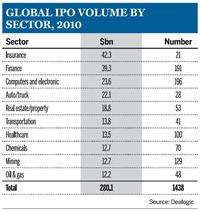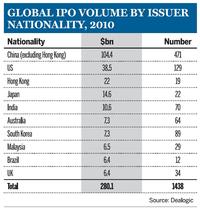IPOs set to maintain positive momentum
Last year was unpredictable for the IPO markets. While some deals performed badly, a lot of IPOs did well and most investors made money. Risks will remain in 2011, particularly in Europe, but emerging markets are seeing a growing share of volumes and prospects are good.
Last year was a roller-coaster ride for initial public offerings (IPOs). Oscillating risk appetite, exogenous shocks and unrealistic expectations led to tight windows of opportunity, uncertain sentiment and a slew of pulled or poorly performing deals.
On reflection, however, it becomes clear that easy generalisations are hard to make across the year, across geographies, or across sectors. As the Greek crisis unfolded, the first quarter of 2010 turned into a bit of a shocker with lots of pulled deals; things quietened down in the second and third quarters, only to end the year on a barnstormer, with equity markets taking the Irish debt crisis in their stride and posting the highest volumes ever recorded in the fourth quarter.
Similarly, the number of withdrawn deals – which increased by 70% compared with 2009 – does not paint an accurate picture of IPO market performance. For one thing, there was much more activity in 2010 than in the previous year. For another, most deals performed well and investors made money. On average, European IPOs, for example, outperformed the market.
External factors
"In the early part of the year, equity markets did suffer because of events elsewhere. There were also a few poor offerings and some vendor expectations were not properly managed. But that is not the whole story," says Craig Coben, head of equity capital markets (ECM) for Europe, the Middle East and Africa (EMEA) at Bank of America Merrill Lynch. "Most IPOs made money; most IPOs coming out of private equity portfolios made money. Therefore it was a good year for IPO investors. That is the real story."
This belies the perception that private equity exits, particularly, were largely poor performers last year. There were some bad launches. Electronics company Promethean World's IPO, managed by Goldman Sachs and JPMorgan, saw its share price fall 70.6% after raising $278m in March (reputedly yielding a 2.5-times return for UK buyout firm Apax Partners).
But there were plenty of good private equity deals too. The $1bn listing of Kabel Deutschland, for example, which reinvigorated the sponsor-backed market after a number of setbacks, was up 70% in December. The transaction was managed by Deutsche Bank, Morgan Stanley, JPMorgan and UBS.
Other private equity exits also did well, including UK fund manager Jupiter (up by 55.3%, underwritten by Bank of America Merrill Lynch and JPMorgan Cazenove) and Israeli home soda company Sodastream (which rose by 21% one day after its US listing, led by JPMorgan and Deutsche Bank).
"There was a lot of cynicism around private equity IPOs last year, but our analysis shows that most of the sponsor-backed IPOs have performed quite well. This was also true for quality offerings in the broader market," says Michael Findlay, the former head of corporate broking at Merrill Lynch who was recently appointed to head up equity advisory for Europe at investment bank Moelis & Co.
Positive sentiment
Sentiment going into 2011 is therefore pretty positive, even while investors are also being selective. "If investors made money last year – and they know they did – they will be receptive to the new opportunities coming forward this year. But they are not indiscriminate – deals will be scrutinised and have to stack up," says Mr Coben.
Last year there was a bifurcation in terms of what investors wanted from a deal. They were either looking for a growth story, or they wanted dividend yields from a safe haven. Deals that fell between those two themes tended to do poorly or not get completed at all. This year, those two themes are still present but, most of all, investors are looking to put money into a quality business with a good story.
"Investor discipline will still be a key characteristic of this year's IPO market," says John Crompton, global head of ECM at HSBC. "Investors were quick to say no to transactions they didn't like last year, and I think that sentiment will still be prevalent this year."
Risk appetite remains a critical factor in the appetite for IPOs – and much of that will be determined by events outside the equity markets. For those factors that are under the control of market participants, the drivers are clear, says Nick Williams, head of ECM EMEA at Credit Suisse. "Investors are looking for companies with solid business models and compelling stories – they can be growth or yield plays – and for sensible pricing. They also want to know what the proceeds of the IPO will be used for. Investors will look carefully at all aspects of a deal."
FIGs bloom
Financial institution group (FIG) volumes will continue to be a strong component of the broader ECM markets, and maybe of the IPO market. While the technology sector led the IPO ranking by number of deals in 2010 (196), it was insurance that led the ranking by volume, with $42.3bn – although a full $31.6bn of this came from just two jumbo deals, both in Asia: AIA Group's $20.5bn listing and Dai-ichi Life Insurance's $18.1bn IPO.
This year, financial institutions' need to raise capital to meet new regulatory requirements, pay back government investment or even to offset lower earnings will be the big drivers for the sector's ECM activity. FIG IPOs will contribute to ECM volumes, but will be market-specific. For example, in the UK it is unlikely that any such IPOs will happen until the Banking Commission has reported later this year and it becomes clear what the prescription will be for the future shape of the UK banking market.
Emmanuel Gueroult, co-head of ECM for EMEA at Morgan Stanley, thinks that last year's IPOs will lead to more block sales this year, including the possible monetisation of government stakes. "There were few [block trades] in 2008 or in 2009, but we started to see them return in Q3 and Q4 of 2010. Volatility is lower than last year. I think we will see more [block trades]. The lock-ups of many IPOs completed last year will be coming to an end, which will fuel activity," he says. "Also, governments that own blocks of stock could be looking to monetise them."
Privatisation prospects
Government exits and privatisation programmes will also contribute to IPO volumes, but deal flow will depend on individual market conditions, says Mr Coben, adding that in Europe, Russia and Poland have privatisation programmes in place, while Spain is looking to sell some assets, some of which could be floated.
"There is still a lot of restructuring to do in the financial sector, including divestment of government-owned assets, which could lead to some IPO activity, but this will be market-dependent. Privatisation programmes are not always predictable and transactions can be politically sensitive," he says.
Most bankers are looking to a rebound in M&A activity to drive up broader ECM volumes – via higher equity components in acquisition financings – and to increase IPO activity. Many expect public companies across a broad range of industries to reorganise or refocus by way of divestment, driving up IPO levels. And everyone is waiting for more sponsor exits.
Increases across the board
On a regional basis, more activity is anticipated across the board. All bankers are predicting a lot more deals out of the US and, with some caveats, a more sprightly market in Europe. Much depends on how the rolling eurozone crisis unfolds, however, and it is difficult to predict the equity market's response.
"The effect [of sovereign credit events] on the equity markets has been very unpredictable," says Mr Coben. "In the early part of last year the impact was significant, but at the back-end of the year, as Ireland's debt crisis intensified, the market seemed able to compartmentalise the sovereign stress away from the equity story and handle the crisis with relative equanimity – perhaps because the market was expecting it. However, that unpredictability means it is impossible to say what will happen if there are further sovereign shocks in Europe, especially in any of the bigger markets."
Emerging growth
There may be more confidence in developed markets in 2011, but it is to the emerging markets (which accounted for 67.2% of total IPO volume and six of the top 10 IPOs priced in 2010) that people are still looking for a large share of activity. "Structurally, most of the growth is coming from the emerging markets, so it is logical that many of the most compelling propositions will be coming from emerging market companies," says Mr Williams.
In emerging EMEA, Poland saw a record IPO in 2010, with insurance firm Powszechny Zaklad Ubezpieczen's $2.7bn listing, and most bankers believe that other emerging markets in EMEA – such as Africa and Russia – are also likely to see more deals in 2011. In January, Russian companies were fast out of the block, with IPO pre-marketing for Hydraulic Machines & Systems, coking coal firm Koks, and Chelyablinsk Tube-Rolling Plant; together, these could raise more than $2bn.
"Russia is coming back – there were three or four deals in Q3 and Q4 2010 and more in the pipeline for Q1 this year," says Morgan Stanley's Mr Gueroult. "Many investors had been underweight in Russia and, with greater confidence about the country's outlook, there is growing appetite for Russian opportunities."
Asian appetite
Naturally, Asia-Pacific accounts for a large slice of investor appetite. Last year, the region's IPO volume totalled $184.7bn and accounted for 66% of global volume, with eight of the 10 largest IPOs in 2010 coming from Asia-Pacific issuers (up from six in 2009).
China is the biggest contributor to Asia's burgeoning volumes: Chinese issuers raised $104.4bn via 471 IPOs in 2010, more than double the $50.6bn raised in 2009 – and accounted for 37.3% of global IPO volume, a trend that was evident in the previous two years' rankings.
Several other Asia-Pacific countries saw record IPOs in 2010, including Malaysia with Petronas Chemicals Group ($3.9bn), India's Coal India ($3.4bn) and Singapore's Global Logistics Properties ($3bn).
But just because a deal is Chinese, it does not guarantee success. Here, too, investors are showing selectivity. In December, the planned $1bn IPO of Chinese wind-power company Huaneng Renewables in Hong Kong was cancelled.
In explaining the cancellation, Huaneng cited excessive market volatility; bankers away from the deal said it did not draw enough demand to cover its books, with investors saying it was too expensive.
Selective investors
Another listing showed that investors are willing, but only for the right deal at the right price. Like Huaneng, China Datang is a wind-power company owned by one of the country's biggest power corporations. Its book was covered a week before it priced, which was shortly after Huaneng, at the bottom of its range and with a lower price-to-earnings ratio.
Bankers say China Datang's smaller deal (at HK$5bn; $640m) was better positioned for investor appetite and benefited from seven cornerstone investors buying about 34% of the offering, limiting the need for extensive bookbuilding.
Whether Asian markets can keep up their breakneck speed is unclear, but it is certain to remain an important, and growing, part of the global business.
It is also clear that the increasing strength of the Hong Kong stock market – which has bagged several of the listings that historically would have been won by the London Stock Exchange – is central to the region's equity market strength.
"The Hong Kong market will continue to win listings and to be a competitor to London. While London is still a great place to list, with huge depth and institutional liquidity and a strong regulatory regime, it may lose some market share to Hong Kong," says Moelis' Mr Findlay.




